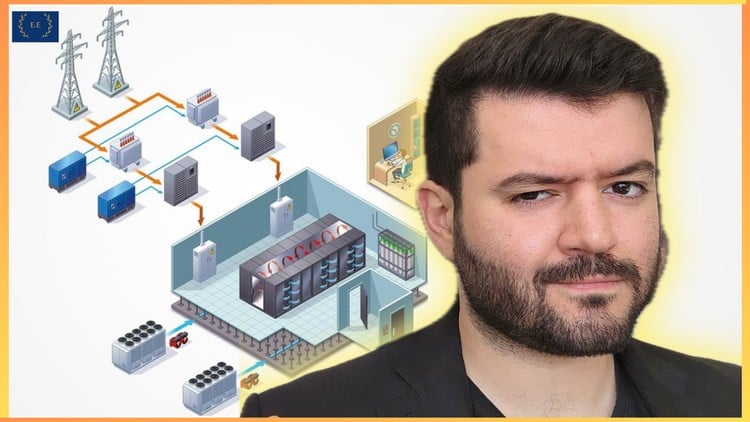
Data Center Electrical Design Engineering/Data Center Electrical Infrastructure/Data Center Power Infrastructure (A-Z)
⏱️ Length: 3.0 total hours
⭐ 4.40/5 rating
👥 6,456 students
🔄 April 2025 update
Add-On Information:
Note➛ Make sure your 𝐔𝐝𝐞𝐦𝐲 cart has only this course you're going to enroll it now, Remove all other courses from the 𝐔𝐝𝐞𝐦𝐲 cart before Enrolling!
- Course Overview:
- This comprehensive course delves into the intricate world of data center electrical infrastructure, providing a foundational and holistic understanding crucial for modern digital ecosystems. It illuminates the systemic architecture and design principles that underpin a truly resilient and high-performing data center power backbone. You’ll explore the entire electrical chain, from utility grid demarcation through to intricate low-voltage distribution and final power delivery to IT equipment racks. The curriculum emphasizes the critical role of electrical design in ensuring uninterrupted operations, business continuity, and data integrity, especially given escalating power demands driven by AI, machine learning, and high-performance computing. Gain insights into future-proofing designs, understanding how today’s infrastructure decisions impact tomorrow’s scalability and operational efficiency. The course unravels the complexities of power flow, highlighting the importance of fault tolerance, redundancy, and load balancing. It provides a strategic lens to view power as a core competitive advantage, directly impacting a data center’s uptime guarantees and service level agreements (SLAs).
- Requirements / Prerequisites:
- A foundational understanding of basic electrical principles, including concepts such as voltage, current, resistance, and power (Watts, VA).
- Familiarity with general IT concepts and the fundamental purpose of data centers is beneficial.
- No advanced engineering degree or specialized software proficiency is mandatory; a keen interest in critical infrastructure design is the primary prerequisite.
- Access to a computer with an internet connection and basic productivity software (e.g., spreadsheet applications for calculations) will be helpful.
- Skills Covered / Tools Used:
- Strategic Power Planning: Develop robust methodologies for power budget forecasting, capacity planning, and managing future load growth for agile, scalable infrastructure.
- Redundancy & Resiliency Design: Master fault-tolerant architectures (N, N+1, 2N) to achieve maximum uptime and minimize single points of failure.
- Equipment Selection & Sizing: Learn criteria for selecting appropriate power equipment (switchgear, busways, distribution panels, cabling) based on efficiency, capacity, and cost-effectiveness.
- Systematic Troubleshooting: Acquire systematic approaches to identify, diagnose, and resolve common power-related issues, minimizing downtime impact.
- Energy Optimization Techniques: Explore advanced strategies for reducing parasitic losses, improving power factor, and implementing demand-side management to enhance efficiency and sustainability.
- Regulatory Adherence & Standards: Gain practical experience interpreting and applying international electrical codes and data center standards (NFPA 70/NEC, IEC, Uptime Institute Tiers) for compliance and risk mitigation.
- Single-Line Diagram Interpretation: Develop proficiency in reading, understanding, and conceptually designing complex electrical single-line diagrams, fundamental to power system analysis.
- Grounding & Bonding Best Practices: Understand the critical importance and correct implementation of grounding and bonding systems for safety, equipment protection, and data integrity.
- DCIM Integration Principles: Explore how electrical infrastructure integrates with Data Center Infrastructure Management (DCIM) tools for real-time monitoring and predictive maintenance.
- Benefits / Outcomes:
- Elevated Career Trajectory: Position yourself for specialized roles like Data Center Electrical Engineer, Critical Facilities Manager, or Infrastructure Consultant, by acquiring highly sought-after expertise.
- Confident Decision-Making: Gain confidence to make informed decisions regarding capital expenditure on power infrastructure, operational strategies, and electrical system risk management.
- Operational Excellence: Contribute directly to improved operational uptime, reduced MTTR for power incidents, and enhanced reliability of data center services.
- Strategic Value Creation: Transform from a technical operator to a strategic contributor, influencing long-term infrastructure planning and aligning power solutions with business objectives.
- Cost & Sustainability Impact: Drive significant operational cost savings through optimized energy consumption, reduced power losses, and extended asset lifespans, contributing to corporate sustainability.
- Enhanced Collaboration: Improve communication with cross-functional teams (IT, mechanical, security) by understanding interdependent infrastructure.
- Global Competency: Develop comprehensive understanding of international best practices and compliance requirements, preparing you for worldwide data center projects.
- PROS:
- Offers practical, immediately applicable knowledge crucial for real-world data center operations and design.
- Provides a holistic view of electrical infrastructure, connecting components to overall system resilience and performance.
- Bridges theoretical electrical engineering with practical data center application, ensuring high relevance.
- Emphasizes industry best practices and international standards, equipping learners with globally recognized competencies.
- CONS:
- As an online course, it inherently offers limited opportunities for direct, physical hands-on experience with live electrical equipment.
Learning Tracks: English,IT & Software,Network & Security
Found It Free? Share It Fast!